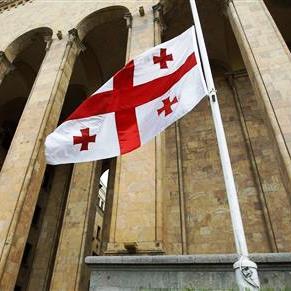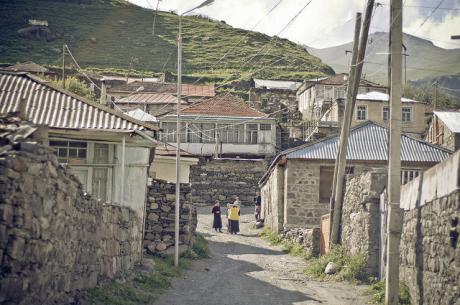(PONARS Eurasia Commentary) The campaign for Georgia’s October 8, 2016, parliamentary election stands out from previous campaigns for its much larger numbers of parties that directly or indirectly espouse anti-NATO and anti-Western views and advocate closer relations with Russia. This appears to be the first time in many years that the Kremlin has attempted to strengthen its presence in the Georgian political landscape in such a way.
Although the Georgian Central Election Commission refused to register Neutral Georgia (Valerij Kvaratskhelia) and the Centrists (Vladimir Bedukadze) because of their obviously pro-Russian declarations (the Centrists’ promised that Georgians would receive Russian pensions!), many of the 19 political parties and six coalitions that were approved have implicit pro-Russian agendas revolving around non-aligned or neutral status demands for Georgia. Parties with such agendas include United Democratic Movement (Nino Burjanadze), Industrialists (Gogi Topadze), People’s Government (Levan Mamaladze), the Communist Party of Georgia, and the Alliance of Patriots of Georgia, to name a few.
Georgian Dream Forges Ahead
The ruling party, Georgian Dream-Democratic Georgia (GDDG), which was founded by billionaire Bidzina Ivanishvili, has a clear advantage in the race if one goes by financial capabilities. According to Georgia’s State Audit Office, in January-August 2016, GDDG received a total of 10.28 million Georgian lari (GEL) (about $4.4 million) in donations.
By comparison, GDDG’s main contender, United National Movement (UNM), which represents the previous government of former president Mikheil Saakashvili, received about GEL 651,000. Surprisingly, the newly formed State for the People Party, led by famous Georgian opera singer Paata Burchuladze, received the second largest amount of donations.
GDDG’s strong financial position is reflected in its expenditures on political advertisements, which in August alone reached GEL 1.49 million compared to UNM’s GEL 715,860 and United Democratic Movement’s GEL 555,525. However, GDDG’s spending spree belies the increasing concerns of its leadership with the public’s mounting discontent over difficult socio-economic conditions and persistent unemployment.
Frustratingly Slow EU Visa Liberalization
The palpable frustration of the Georgian government and the public with the lack of progress on visa liberalization with the EU plays into the hands of the pro-Russian political parties at the same time that it increases skepticism toward Euro-integration.
The intensive lobbying efforts by both Prime Minister Giorgi Kvirikashvili and President Giorgi Margvelashvili in Berlin in June 2016 softened the German government’s obstruction of the visa liberalization process for Georgia, but did little to expedite its finalization before the October 8 parliamentary elections.
Had the government been able to boast of its finalization prior to the election, the GDDG government’s credentials and position would have been bolstered and, even more importantly, pro-Western sentiment within the public at large would have been given a major boost with a corresponding impact on the election results. Yet there is only a very slim chance that the European Parliament will vote for a visa waiver for Georgian citizens in the Schengen area during its ongoing plenary session of October 3-6.
Repeated delays provide pro-Russian political forces with ammunition to describe the Euro-integration agenda as an exercise in futility at a time when the EU is embroiled in its own internal crises, especially those caused by Brexit and large flows of refugees from the Middle East.
Polarized Electoral Environment Amid Voter Apathy
On September 23, 2016, the OSCE’s Office for Democratic Institutions and Human Rights (ODIHR) released its interim report on the electoral environment. It notes that the “elections are taking place in an environment influenced by the country’s poor economic performance along with the public disillusionment with the political elite.” It also made note of some violent incidents, including a mass brawl targeting members of the main UNM opposition group in the village of Kortskheli in May.
On September 14, Kvirikashvili, who is also the GDDG party chairman, accused UNM of plotting to destabilize the situation in the country through affiliated groups in the run-up to the parliamentary elections. Kvirikashvili’s accusations followed vaguely worded remarks by Interior Minister Giorgi Mgebrishvili, who a day earlier pointed out that “some political parties” intended to carry out “provocations during and after the elections.”
Pressure on UNM increased on September 27, when an audio recording of a conversation purportedly between Saakashvili and high-ranking UNM party officials was released. This dialogue included references to a plan for pursuing a “revolutionary scenario” through post-election protests. In response, the State Security Service launched a criminal investigation centered on this alleged plot to violently overthrow the government.
Lastly, on September 29, the Georgian security service and law enforcement authorities discovered several large underground weapons caches at different locations. According to a press release issued by the Ministry of Internal Affairs, the caches dated back to 2009-2011, but their discovery added to the tense pre-election atmosphere.
Bobbing for Rotten Apples
Against the backdrop of these developments, the emergence of pro-Russian political forces on Georgia’s domestic political scene would have been largely unnoticed had it not been for the intense (and at times intentionally exaggerated) focus on them by the pro-Western parties, especially UNM but also the Free Democrats and to some extent the Republicans.
One prominent member of the Republican party, Defense Minister Tinatin Khidasheli, repeatedly went on record during her frequent visits to Washington, DC, to voice alarm over what she said was the very real possibility that, for the first time in Georgia’s post-Soviet history, pro-Russian parties could enter the legislature.
Such assertions do not correspond with the most reliable public opinion polls, however, which consistently show that the pro-Russian parties do not garner enough public support to surpass the 5 percent threshold necessary to win a parliamentary delegation.
According to the latest poll commissioned by Imedi TV and conducted by the American polling firm JPM and the Georgian Opinion Research Business International (Gorbi) organization on September 16-24, Burjanadze’s United Democratic Movement and the Alliance of Patriots of Georgia were at only 1.7 and 2.2 percent, respectively.
In another poll conducted by the American-German company GfK and commissioned by the pro-UNM TV station Rustavi-2 in August, the United Democratic Movement received 1.4 percent while the Alliance of Patriots garnered 1.6 percent. Considering that turnout is likely to be low due to widespread voter apathy, the chances of pro-Russian parties look rather slim.
Conclusion
As Georgia prepares to vote in its parliamentary elections, the threat of pro-Russian forces entering the parliament seems to be overblown. Despite palpable popular disillusionment with a lack of progress on Georgia’s path toward Euro-Atlantic integration, the prevailing sentiments have not aligned to threaten the country’s pro-Western orientation.
The elections to the lower chamber of Russia’s own parliament (State Duma) held in Georgia’s breakaway regions of Abkhazia and South Ossetia on September 18 caused considerable consternation in the Georgian government and population alike. This certainly did not help the attempts of pro-Russian parties in their campaign to garner electoral support.
Another major obstacle these parties face is that they failed to unite into one electoral bloc. This would have enabled them to consolidate the votes, which, in turn, would have increased their chances of surpassing the threshold to enter the parliament. The composition of the new parliament is likely to be more pluralistic as GDDG will almost certainly struggle to retain the plurality it now possesses (48 out of 150 seats). This will probably result in increased legislative gridlock and potential difficulties in forming the next coalition government.
As to the “Russian scare,” the Georgian political establishment, both the government and the pro-Western opposition, have employed it in talks with the EU and United States to press them to expedite the visa-free regime and accelerate defense assistance.











